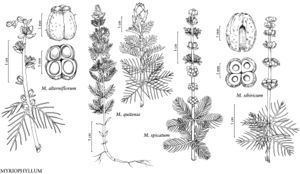Myriophyllum alterniflorum
Fl. Franç., ed. 3, 6: 529. 1815.
Herbs monoecious, aquatic, often forming dense stands. Stems often branched, to 2.5 m. Turions absent. Leaves usually in whorls of 3 or 4 (or 5), rarely opposite, distal emersed leaves alternate, heteromorphic; petiole 0–0.5 mm; submersed leaves pectinate, ovate to elliptic or obovate in outline, 3–16 (–40) × (3–) 4–10 (–14) mm, segments 6–16 (–20), linear-filiform, longest segment 2–11 (–15) mm; emersed leaves elliptic to oblanceolate or spatulate proximally, pectinate to pinnatifid distally, 0.7–2 × 0.3–0.5 mm, segments 0–10 (–12), margins ± serrate to shallowly lobed. Inflorescences to 12 cm; flowers proximally pistillate, in whorls of 4, often medially bisexual, distally staminate from alternate bracts; bracteoles cream to stramineous, with distinct brown to purple margins, ovate to depressed-ovate, 0.2–0.5 × 0.2–0.5 mm, margins serrate to irregularly fringed, apex often aristate. Staminate flowers: sepals cream to stramineous, narrowly triangular, 0.1–0.2 × 0.1 mm; petals caducous, cream, elliptic to obovate, (0.7–) 1.3–1.8 × (0.4–) 0.6–1 mm; stamens 8, filaments to 0.6 mm, anthers cream to purple, 1.1–1.5 ×0.2–0.4 mm. Pistillate flowers: sepals cream, lanceolate to triangular or deltate, 0.1–0.2 × 0.1 mm; petals usually caducous, rarely persistent, cream, widely ovate, 0.2–0.4 × 0.2–0.3 mm; pistils 0.7–1.1 mm, stigmas red to ± purple, pulvinate, to 0.3 mm. Fruits ovoid, 4-lobed. Mericarps olive-green to redbrown, cylindric to narrowly ovoid, 1.3–1.6 × 0.3–0.4 mm, transversely widely obovate, abaxial surface broadly rounded, irregularly to densely papillate, sometimes with orange to red, punctate trichomes, wings and ridges absent. 2n = 14.
Phenology: Flowering and fruiting Apr–Sep.
Habitat: Oligotrophic to mesotrophic waters, lakes, rivers, sandy substrates.
Elevation: 0–500 m.
Distribution
Greenland, St. Pierre and Miquelon, Man., N.B., Nfld. and Labr. (Nfld.), N.W.T., N.S., Ont., Que., Sask., Alaska, Conn., Maine, Mass., Mich., Minn., N.H., N.Y., R.I., Vt., Wis., Eurasia, n Africa
Discussion
Myriophyllum alterniflorum is distinguished in flower and fruit by minute, alternate, entire distal floral bracts, a characteristic shared only with M. laxum. Unlike the flowers of other Myriophyllum species in the flora, those of M. alterniflorum are widely scattered along the inflorescence and the tip of the spike is often nutant. The pistils are relatively small, each having a prominent, purple, pulvinate stigma that is as broad as or broader than the ovary and persistent in fruit. The pistil and mericarp surface has scattered orange to red punctate trichomes not seen on the pistils or mericarps of any other water-milfoil in the flora area. The cream, depressed-ovate, fringed, often aristate bracteoles with brown to red margins are also distinctive. Seed-set appears to be rare in M. alterniflorum. Specimens examined from Greenland far exceed other North American plants in the size of their leaves and staminate flowers. North American plants with relatively short leaves and a bushy habit have been referred to as var. americanum. Plants of this form can be confused with the relatively small M. sibiricum and M. verticillatum in northern latitudes but are distinguishable based on floral characters. Leaf size in M. alterniflorum is plastic and continuous in variation, thus varieties are not recognized here as separate taxa.
Selected References
None.
